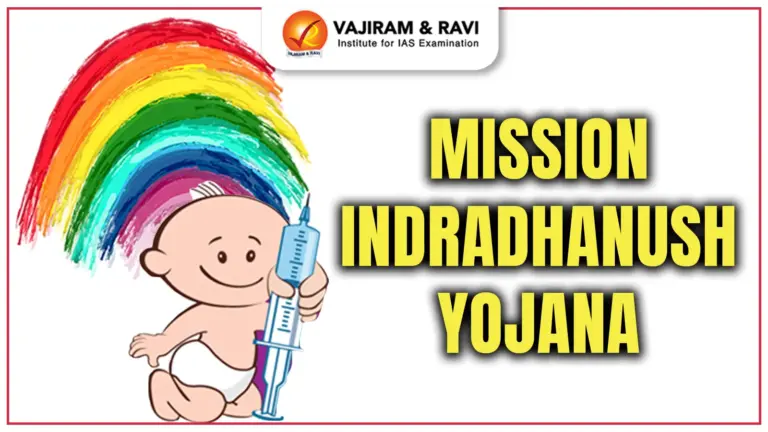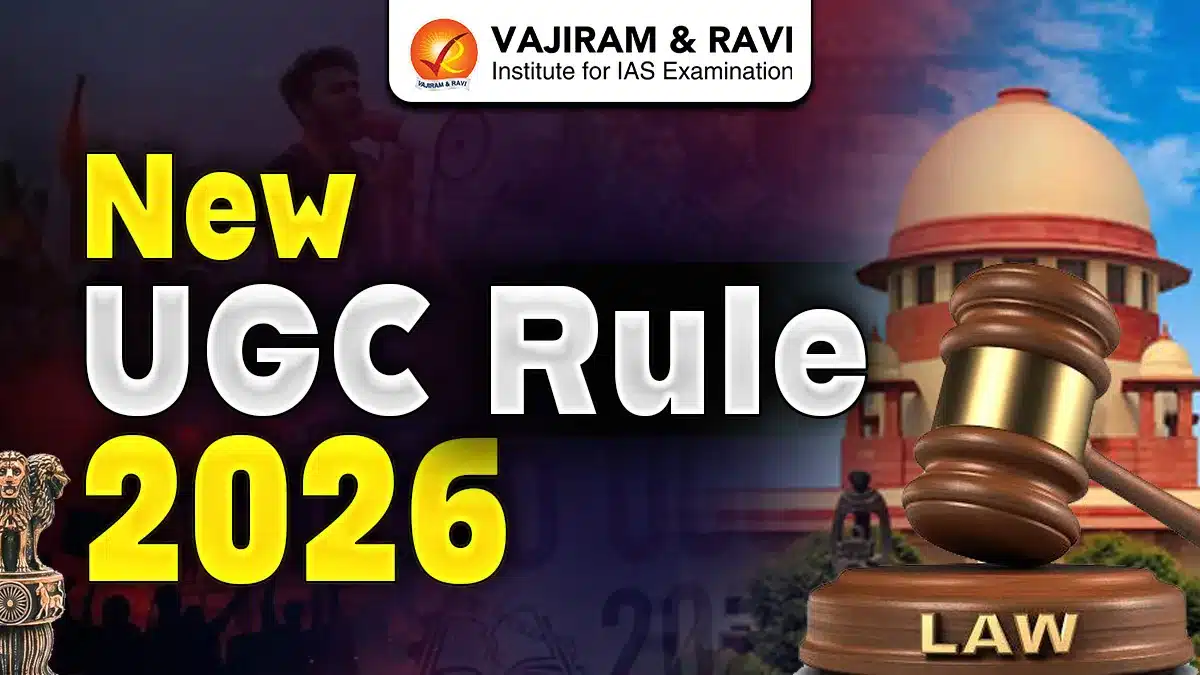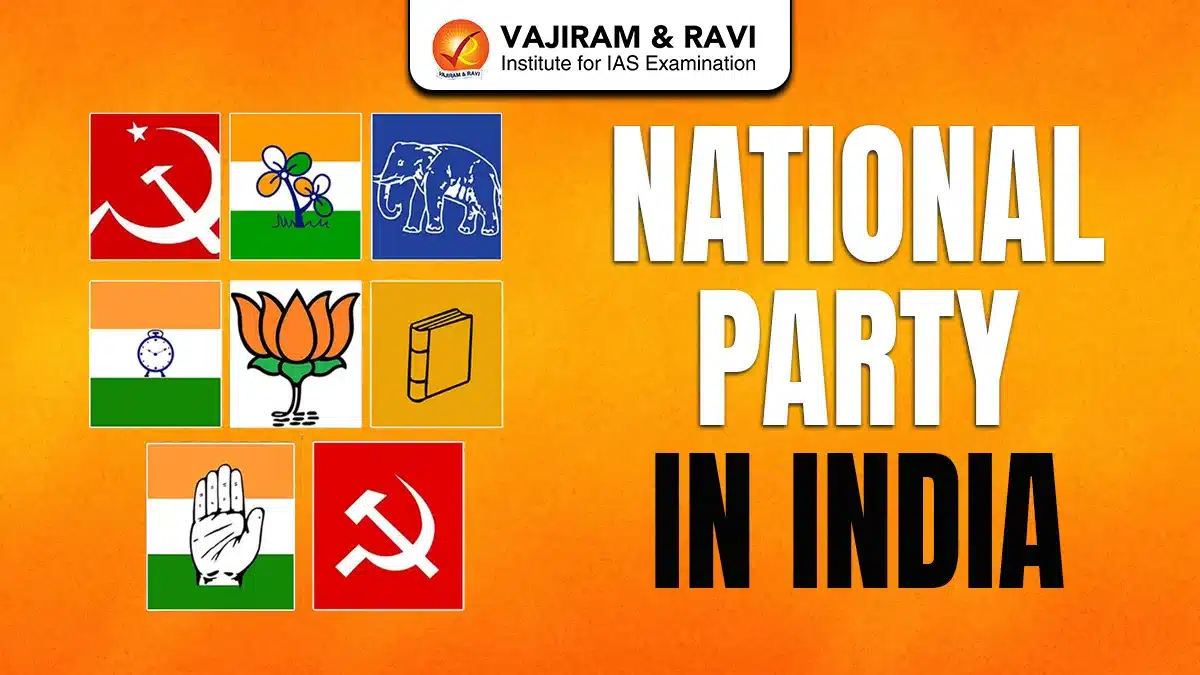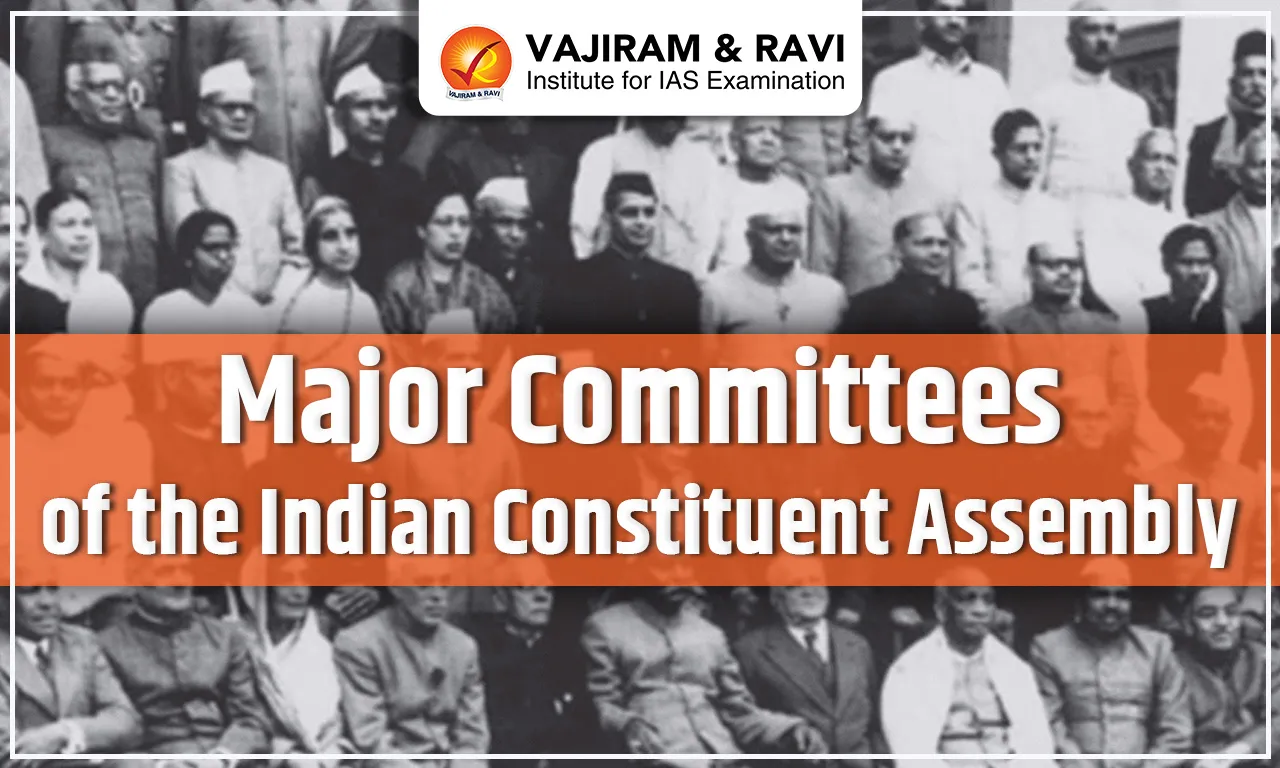Mission Indradhanush Yojana was launched on December 25, 2014, by Union Health Minister JP Nadda, which is a flagship immunization initiative of the Government of India. It aims to increase the immunization coverage for children under two years and pregnant women. The Mission is also known as “Mission Rainbow,” focuses on reducing child mortality due to vaccine-preventable diseases. With targeted strategies, periodic campaigns, and intensive monitoring, it has evolved into multiple phases like Intensified Mission Indradhanush (IMI) and its subsequent versions. It plays a crucial role in enhancing public health infrastructure across the country.
Mission Indradhanush Yojana Objectives
The Mission Indradhanush Yojana Objectives is to achieve full immunization coverage for all children and pregnant women in India. It strives to close the immunization gaps in underserved, remote, and marginalized communities. The mission seeks to reduce child mortality and morbidity by protecting against life-threatening diseases. By ensuring last-mile delivery of essential vaccines, it supports the government’s goal of achieving Universal Immunization. It also encourages inter-departmental coordination to ensure better health outcomes.
Mission Indradhanush Yojana Diseases Covered
The inclusion of Mission Indradhanush Yojana Diseases Covered aligns with WHO-recommended immunization schedules which is discussed below:
- Diphtheria: A serious bacterial infection that primarily impacts the respiratory system. If left untreated, it can result in complications such as breathing difficulties, heart damage, and even death.
- Pertussis (Whooping Cough): A highly contagious respiratory illness characterized by severe, repetitive coughing fits. It poses significant risks to infants and young children due to its potential complications.
- Tetanus: Triggered by a bacterial toxin, tetanus causes intense muscle stiffness and spasms. Without timely medical intervention, it can be fatal.
- Tuberculosis (TB): A bacterial infection that most commonly affects the lungs, though it can spread to other organs. TB remains a major public health concern due to its contagious nature.
- Polio: A viral disease that can invade the nervous system and lead to paralysis. In its most severe form, polio can be life-threatening.
- Hepatitis B: This viral infection targets the liver and can result in chronic conditions, including liver cirrhosis and hepatocellular carcinoma (liver cancer).
- Meningitis and Pneumonia caused by Haemophilus influenzae: These bacterial infections can cause inflammation of the brain and lung tissues, respectively. Both conditions are potentially life-threatening and require immediate medical attention.
List of Mission Indradhanush Yojana Covered State/Districts
The program covered 201 high-focus districts in its initial phase and later expanded to more regions. States like Bihar, Uttar Pradesh, Madhya Pradesh, and Rajasthan saw extensive implementation due to their low immunization coverage. Each state included specific districts based on immunization gaps identified by surveys. The table below includes the List of Mission Indradhanush Yojana Covered State:
|
State/UT |
Districts Covered |
|
Andhra Pradesh |
East Godavari, Guntur, Krishna, Kurnool, Visakhapatnam |
|
Arunachal Pradesh |
Changlong, East Kameng, East Siang, Lohit, Upper Siang |
|
Assam |
Bongaigaon, Darrang, Dhubri, Goalpara, Hailakandi, Karimganj, Kokrajhar, Nagaon |
|
Bihar |
Araria, Begusarai, Champaran East, Champaran West, Darbhanga, Gaya, Jamui, Katihar, Kishanganj, Muzaffarpur, Patna, Saharsa, Samastipur, Sitamarhi |
|
Chhattisgarh |
Balodabazar Bhatapara, Bijapur, Bilaspur, Dantewada, Jashpur, Korba, Raipur, Sarguja |
|
Delhi |
North-East, North-West |
|
Gujarat |
Ahmedabad, Ahmedabad Corpn., Banaskantha, Dahod, Dangs, Kutch, Panchmahal, Sabarkantha, Valsad |
|
Haryana |
Faridabad, Gurgaon, Mewat, Palwal, Panipat |
|
Jammu & Kashmir |
Doda, Kishtwar, Poonch, Rajouri, Ramban |
|
Jharkhand |
Deoghar, Dhanbad, Giridih, Godda, Pakur, Sahibganj |
|
Karnataka |
Bangalore (Urban), Bellary, Gulbarga, Koppal, Raichur, Yadgir |
|
Kerala |
Kasaragod, Malappuram |
|
Madhya Pradesh |
Alirajpur, Anuppur, Chhatarpur, Damoh, Jhabua, Mandla, Panna, Raisen, Rewa, Sagar, Satna, Shadol, Tikamgarh, Umariya, Vidisha |
|
Maharashtra |
Beed, Dhule, Hingoli, Jalgaon, Nanded, Nasik, Thane |
|
Manipur |
Churachandpur, Senapati, Tamenglong, Ukhrul |
|
Meghalaya |
East Khasi Hills, West Garo Hills, West Khasi Hills |
|
Mizoram |
Lawngtlai, Lunglei, Mamit, Saiha |
|
Nagaland |
Dimapur, Kiphire, Kohima, Mon, Tuensang, Wokha |
|
Odisha |
Boudh, Gajapati, Ganjam, Kandhamal, Khurda, Koraput, Malkangiri, Nabarangpur, Nuapada, Rayagada |
|
Pondicherry |
Yanam |
|
Punjab |
Gurdaspur, Ludhiana, Muktsar |
|
Rajasthan |
Alwar, Barmer, Bundi, Dhaulpur, Jaipur, Jodhpur, Karauli, Sawai Madhopur, Tonk |
|
Tamil Nadu |
Coimbatore, Kancheepuram, Madurai, Thiruvallur, Tiruchirappalli, Tirunelveli, Vellore, Virudhunagar |
|
Telangana |
Adilabad, Mahbubnagar |
Intensified Mission Indradhanush (IMI)
- Launched on October 8, 2017, Intensified Mission Indradhanush (IMI) aimed to reach every child under two and pregnant women left out of routine immunization.
- It focused on 173 districts and urban areas with low vaccination coverage.
- The goal was to achieve over 90% full immunization by December 2018. It involved four intensified rounds of immunization, each conducted for seven days.
- Ministries other than Health, like WCD and Urban Development, participated actively to ensure inter-sectoral coordination.
Intensified Mission Indradhanush 3.0
- Intensified Mission Indradhanush 3.0 was introduced in February 2021 to address disruptions caused by the COVID-19 pandemic.
- It was conducted in two rounds across 250 districts.
- The campaign focused on vaccinating children and pregnant women who missed doses during lockdowns.
- It emphasized rigorous micro-planning and community engagement to restore immunization levels. Special attention was given to urban slums, tribal areas, and hard-to-reach pockets.
- It helped regain momentum in public health services affected by the pandemic.
Intensified Mission Indradhanush 4.0
- Intensified Mission Indradhanush 4.0 was launched in February 2022 with the aim to cover 416 districts across 33 states and UTs. This phase conducted three rounds of immunisation from February to May 2022.
- It focused on those who had missed their regular doses in earlier campaigns or during the pandemic.
- The campaign used a revised strategy with greater focus on urban and peri-urban areas.
- Technological platforms and real-time data tracking enhanced accountability and effectiveness.
Intensified Mission Indradhanush 5.0
- Intensified Mission Indradhanush 5.0 was carried out from August to October 2023 and introduced a major upgrade in monitoring through the U-WIN digital platform.
- It extended the vaccination age group from 0–2 years to children up to 5 years.
- The campaign focused particularly on improving Measles-Rubella vaccination. The use of a digital platform allowed better beneficiary tracking, improved data quality, and ensured no child was left behind.
- IMI 5.0 showed a more data-driven and digital future for India’s immunization system.
Vaccination Strategy
Mission Indradhanush Yojana follows a structured, multi-layered strategy to reach all eligible beneficiaries. It integrates routine immunization with special catch-up rounds for those who missed vaccines. The program uses micro-planning at the block level to identify target groups and ensure door-to-door outreach. Health workers, ASHAs, and ANMs play a vital role in mobilization and administration. Regular monitoring through district and state-level task forces ensures transparency. Effective cold chain and logistics systems are also integral to its success.
Mission Indradhanush Yojana Challenges
Despite notable progress of Mission Indradhanush Yojana continues to encounter several operational challenges:
- Geographical Accessibility: Reaching remote or underserved regions remains a significant obstacle in vaccine delivery. To mitigate this, mobile health units and targeted outreach initiatives have been deployed.
- Public Awareness and Education: Limited awareness and persistent misconceptions about immunization hinder vaccine coverage. Addressing these gaps through sustained educational efforts is essential.
- Supply Chain Efficiency: Ensuring an uninterrupted and timely supply of vaccines necessitates robust logistics and inventory management systems to avoid stockouts and delays.
Mission Indradhanush Yojana Solutions
To tackle these issues, the Mission Indradhanush Yojana incorporates a range of strategic measures:
- Expanded Outreach Campaigns: Educational drives and information dissemination efforts are undertaken to raise public awareness and emphasize the importance of timely vaccination.
- Enhanced Logistics Framework: Strengthening the infrastructure for storage, transport, and distribution ensures the availability of vaccines across all targeted regions.
- Community-Based Mobilization: Active participation of community leaders and local healthcare personnel is encouraged to build trust, resolve doubts, and improve acceptance of immunization programs.
Mission Indradhanush 2.0
Mission Indradhanush 2.0 was launched in December 2019 and continued till March 2020. It was designed to build upon the previous gains and address missed targets. The program focused on 272 districts across 27 states and UTs. It used an evidence-based approach to identify areas with low vaccine coverage. Community mobilization, improved logistics, and digital tools were key pillars. This phase was especially important in re-energizing frontline health workers and public health awareness campaigns.
Mission Indradhanush Yojana Achievements
- Mission Indradhanush Yojana significantly increased India’s immunization coverage, with many districts crossing the 90% mark in full immunization.
- It helped reduce incidence rates of vaccine-preventable diseases like polio and measles. The campaign also improved community-level awareness regarding maternal and child healthcare.
- It strengthened India’s health infrastructure and built inter-sectoral coordination models that were later used during COVID-19 vaccination drives.
- Global agencies like WHO and UNICEF have recognized India’s commitment and success through this initiative.
Last updated on March, 2026
→ UPSC Notification 2026 is now out on the official website at upsconline.nic.in.
→ UPSC IFoS Notification 2026 is now out on the official website at upsconline.nic.in.
→ UPSC Calendar 2026 has been released.
→ UPSC Final Result 2025 is expected to be released soon.
→ Check out the latest UPSC Syllabus 2026 here.
→ Join Vajiram & Ravi’s Interview Guidance Programme for expert help to crack your final UPSC stage.
→ UPSC Mains Result 2025 is now out.
→ UPSC Prelims 2026 will be conducted on 24th May, 2026 & UPSC Mains 2026 will be conducted on 21st August 2026.
→ The UPSC Selection Process is of 3 stages-Prelims, Mains and Interview.
→ Prepare effectively with Vajiram & Ravi’s UPSC Prelims Test Series 2026 featuring full-length mock tests, detailed solutions, and performance analysis.
→ Enroll in Vajiram & Ravi’s UPSC Mains Test Series 2026 for structured answer writing practice, expert evaluation, and exam-oriented feedback.
→ Join Vajiram & Ravi’s Best UPSC Mentorship Program for personalized guidance, strategy planning, and one-to-one support from experienced mentors.
→ Check UPSC Marksheet 2024 Here.
→ UPSC Toppers List 2024 is released now. Shakti Dubey is UPSC AIR 1 2024 Topper.
→ Also check Best UPSC Coaching in India
Mission Indradhanush Yojana FAQs
Q1. What is the Mission Indradhanush Yojana?+
Q2. How many diseases are covered under this scheme?+
Q3. What is Intensified Mission Indradhanush (IMI)?+
Q4. Is Mission Indradhanush still active?+
Q5. Who monitors the campaign?+


















